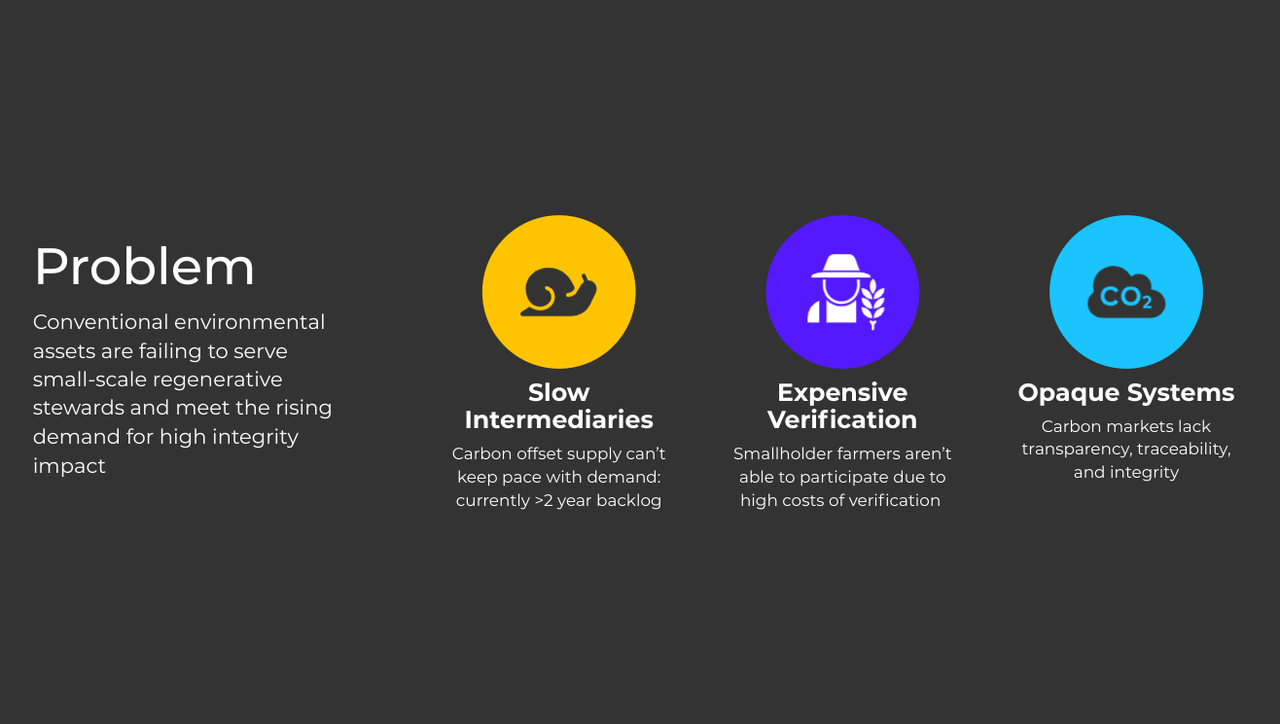Technology for a thriving planet, holistic eco assets, pathways for regenerative jobs of the future.
TL;DR:
🌻 Vision → Mission → Goal → We envision a future where humanity's capacity to regenerate ecosystems surpasses the rate at which we degrade them. To turn this vision into reality, our mission is to transform regeneration into an occupation. Our immediate goal is to streamline the onboarding process into Regenerative Finance (ReFi) and make the verification of small-scale impact both feasible and cost-effective.
But why ❔
🚨 The planet's ecosystems are under threat, with degradation outpacing regeneration. Small-scale regenerators hold the key to reversing this trend, but face barriers like the high costs of originating environmental assets and complex, fragmented onboarding processes in the ReFi space. We're bridging the gap, enabling regenerators to earn a living through tangible impact.
So, what are we actually building ❔
1️⃣ RegenPath: A dApp designed to simplify and enhance the onboarding process for regenerators looking to make an income while making an impact. It will help non-tech savvy obtain a non-custodial multi-chain wallet, match-make them with opportunities for regenerative income, and provide peer-to-peer credentials & attestations.
2️⃣ Adaptive Agroforestry & Smallholder Stewardship: A pioneering methodology that facilitates the issuance of eco credits on Regen Network, enabling small-scale regenerators to originate practice-based, environmental stewardship credits from verified regenerative practices like Syntropic Agroforestry in diverse bioregions across the globe.
GG22 Update & Next Steps
📗 RegenPath: Empowering Regenerative Land Stewards
RegenPath is a digital platform designed to onboard millions of environmental stewards, or "Regenerators," into the world of Regenerative Finance and web3. By leveraging a vector-based matchmaking engine, multi-chain wallet, digital identifiers (DIDs), and issuing Bioregional Passports (a form of verifiable credentials or VCs), RegenPath aims to help anyone find their pathway to earning a regenerative income.
Thanks to previous funding rounds, we are ready to launch the first core function of RegenPath, pathfinding.
The MVP will serve as a matchmaking tool to guide Regenerators on available options for getting paid to make a positive impact. We have built a database of projects that include existing systems for paying people for positive action. After answering an onboarding questionnaire, Regens will be matched with a pathway based on their unique context, like skills, geography, and access to resources that make an individual well-suited for a specific pathway.
With the matchmaking engine & database complete, the next step will be to add multi-chain wallet creation & abstraction, & explore how the Bioregional Passport feature will serve as a recognized and verifiable system to acknowledge the skills, reputation, and contributions of Regenerators across various bioregions.
Use cases for Bioregional Passports include:
Reputation Sensing: Revealing disconnects from the community.
Onboarding and Tracking Eco Assets: Facilitating the process of integrating ecological assets.
Empowering Volunteers and Traveling Regenerators: Facilitating a peer-to-peer system to issue badges that recognize skills and experiences.
Tracking Regen Experts and Consultants: Monitoring their impact on projects over time.
Engaging Patrons and Contributors: Facilitating eco-tourism and tracking contributions to regenerative projects, rewarding funding milestones with unique opportunities.
Funds from GG22 will be focused primarily on building out these web3 related features of RegenPath.
🌳 Adaptive Agroforestry & Smallholder Stewardship (AASS) Methodology
We're developing and implementing the Adaptive Agroforestry & Smallholder Stewardship (AASS) methodology to assist smallholder farmers in adopting agroforestry practices. The methodology is adaptive and flexible, allowing for customization based on varying agro-ecological contexts. It focuses on practice-based eco-credits, with the potential for future outcomes-based credit issuance as carbon and biodiversity modeling can be performed on the collected data over time.
Our monitoring approach will use a combination of decentralized, digital Measurement, Reporting, and Verification (MRV) solutions, applying the concept of Data Fidelity. This means eco-credits may be issued with varying levels of certainty, from low-fidelity (one form of sensing technique) to high-fidelity (all sensing techniques present and cross-referenced).
Over the next year, we plan to develop and implement this methodology, which is based on observations from on-the-ground agroforestry projects around the world, including locations in Barichara Colombia, Ndula Zambia, and Lima Duarte Brasil.
In conclusion
At Sunflower EcoTech, our principles of regeneration, collaboration, diversity, and transparency guide us. We prioritize the needs of regenerators, those on the frontlines of ecological restoration, and strive to create tools and methodologies that support and validate their invaluable work.
We embrace collaboration, value radical truth and transparency, and prioritize action. We're not just building products; we're fostering a community that seeks to understand and address the complexities of our world.
As we look to the future, we're excited about our projects' potential to accelerate humanity's capacity to regenerate ecosystems faster than we degrade them. But we can't do it alone. We need your support.
By donating to this grant, you're investing in a regenerative future. You're joining a community of regenerators, innovators, and dreamers who believe in the power of collective action to heal our planet.
Join us on this journey. Donate to this grant today. Together, we can sow the seeds for a regenerative future. Let's regenerate ourselves and the world, one step at a time. Donate Now.
🌻🌻🌻🌻🌻🌻🌻
🌻 Sunflower EcoTech 🌻 History
-
applied to the GG22 OSS - dApps and Apps 2 weeks ago which was rejected
-
accepted into Climate Solutions Round 3 months ago.
-
accepted into Climate Round 7 months ago.







